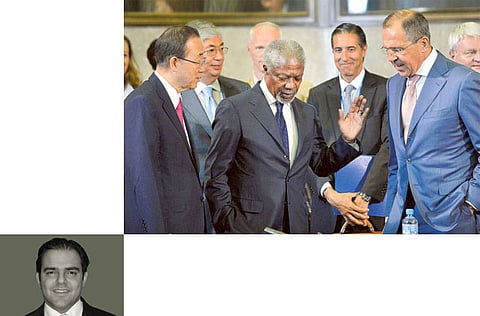History will be harsh with the Geneva Conference
Nobody seems to be in a hurry to end the violence in Syria

The Geneva meeting that took place last Saturday was indeed, as many commentators predicted, another failed attempt at doing something serious for Syria. Failure is actually an understatement. The Geneva meeting was a catastrophe because it revealed how helpless and clueless the international community is about Syria. David Aaron Miller, a top former US Middle East envoy, described it as a “let’s make ourselves feel better” club aimed at figuring out “what to do about Syria”. Nobody seems to be in a hurry to end the violence in Syria.
The Americans are unwilling to get engaged any further, too busy with election year. The Turks don’t have the will or the way to put their big words in action. The Qataris and Saudis are still bankrolling the armed insurgency, completely uninterested in stopping the flow of arms. The Israelis are thrilled with a country falling apart before their eyes, no longer able to meddle in Palestinian affairs or to support non-state players such as Hezbollah, as it has done for the past 30 years. The Iranians are grinning at the situation in Syria, and so is Hezbollah, satisfied with a country that is weak and becoming totally dependent on Tehran. Moscow, for that matter, is thrilled at Syria becoming a Russian satellite like never before. Paying the price for all these are the people of Syria.
The Geneva meeting — which brought the permanent five at the Security Council, plus Turkey, Kuwait and Qatar — was aimed at discussing a new Annan Plan, now that the former UN secretary-general’s six-point plan is dead. According to a non-paper sent by Kofi Annan to participants ahead of the conference, an end to violence and a transitional unity government were the end objectives for Syria, with no reference whatsoever to Bashar Al Assad.
The unity government, in theory, would supervise new parliamentary elections, to be internationally monitored, a new constitution and a power-sharing formula between the opposition and the Baathists. Contrary to what many predicted, nothing was said about early presidential elections by December 2012 and no timetable was set for achieving any of the Geneva outcomes.
Undermining the credibility
The only winners at the Geneva meeting were the Russians whose Foreign Minister, Serge Lavrov, said he was “delighted” by the results. The final communique said the transitional government should be formed “on the basis of mutual consent” and omitted text that had appeared in Annan’s non-paper, which explicitly said that the new government “would exclude from government those whose continued presence and participation would undermine the credibility of the transition and jeopardise stability and reconciliation”. The final communique, of course, had Russia’s fingerprints all over it.
Prior to the meeting, the Russians had made it clear that they had several “red lines” that needed to be observed over any future deal on Syria. One was a “no” to unilateral Turkish military action, because the Russian Army would never allow it. It said “no” to Islamification of Syria; letting the country slip squarely into Saudi control, banking on its long experience in fighting Saudi-backed Islamists in Chechnya. It also said “no” to a Nato military strike, so long as the Annan Plan was on the table. Moscow is also adamant about preventing a state breakdown in Syria, as what happened in Libya.
The spill-over effect in Syria’s case would be catastrophic for Iraq, Lebanon and Jordan and pulling Syria back together, if the country snaps completely, would be a time-consuming and extremely costly process.
Russia has also made it clear that there will be no breakdown of the Syrian Army, which it has helped train and arm since 1957. It is the Syrian military establishment after all, that has been Russia’s main ally in Syria for more than 50 years. Over that time period, however, it dealt with seven different Syrian presidents, from Shukri Al Quwatli to Bashar Al Assad, and was always more interested in long-term strategic interests, rather than individuals.
Both Russia and the international community, however, failed at answering one fundamental question: How to arrive upon a cabinet of national unity, when the regime sees almost all opposition figures as traitors and while no member of the opposition is willing to take part in any government so long as Al Assad is around? They also failed to realise that a cabinet of national unity is the last thing on the minds of the people of Syria.
Horrific death toll
The basic ingredients for dialogue, after all, are completely absent, with the Syrian Army still involved in massive operations on all four corners of the country, with an opposition that insists that it will never deal with the present regime and violence that has whipped up a horrific death toll of 15,000 Syrians in 15 months.
The international community realises, however, that what is happening in Syria today is the end of an era. No matter how hard the Russians try to breathe life into it, the Syrian regime — as the world knew it — is history. Turning the clock back to mid-March 2011, or maintaining the status quo until 2014 are both equally impossible.
Also impossible, for that matter, is a Libya-like or Iraq-like scenario for Syria. Sooner or later, however, the country will cave in from within, and all participants at the Geneva Conference, in addition to both the Syrian regime itself and the Syrian opposition, will have to answer to history as to why they allowed the country to collapse.



